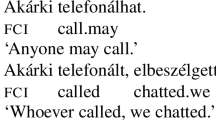ABSTRACT.
Fresh evidence from Free Choice Items (FCIs) in French question the current perception of the class. The role of some standard distinctions found in the literature is weakened or put in a new perspective. The distinction between universal and existential is no longer an intrinsic property of FCIs. Similarly, the opposition between variation-based vs intension-based analyses is relativized. We show that the regime of free choiceness can be characterized by an abstract constraint, that we call Non-Individuation (NI), and which can be satisfied in different ways that match current distinctions. NI says that the information conveyed by a sentence containing a FCI should not be reducible to a referential situation, that is a situation in which particular individuals satisfy the sentence in the current world. The widely used resource of modal variation becomes a particular scenario of free-choiceness, not its ‘essence’. In fact, we show that under certain conditions, FCIs can occur in episodic, non-modal sentences, a fact that NI can accommodate. We also discuss more fine-grained aspects of the semantics of FCIs, such as their emotional colour. (. . .) the tripod fell spontaneously, because, though it stood on its feet so as to serve for a seat, it did not fall so as to serve for a seat. Aristotle, Physics II,6.
Similar content being viewed by others
References
Anderson Alan Ross Nuel D. Belnap SuffixJr. (1975) Entailment. The Logic of Relevance and Necessity, Vol. I Princeton University Press The Logic of Relevance and Necessity
Alan Ross Anderson NuelD. Belnap SuffixJr. J. Michael Dunn (1992) Entailment. The Logic of Relevance and Necessity Vol. II Princeton University Press Princeton
D.M. Armstrong (1997) A World of States of Affairs Cambridge University Press Cambridge
Nicholas Asher Morreau Michael (1995) ’What Some Generic Sentences Mean’ G.N. Carlson F.J. Pelletier (Eds) The Generic Book Chicago University Press Chicago 300–338
Bertocchi, Alessandra: 2000, ’Scalarity and Concession: The Case of quamvis’, manuscript, University of Bologna.
Patrick. Blackburn (2000) ArticleTitle’Representation, Reasoning and Relational Structures: A Hybrid Logic Manifesto’ Journal of the IGPL 8 339–365
Patrick Blackburn Marx Maartens (2002) ArticleTitle’Remarks on Gregory’s “actually” Operator’ Journal of Philosophical Logic 31 281–288
Ariel. Cohen (1999) Thing Generic! The Meaning and Use of Generic Sentences CSLI Stanford
Francis Corblin (1997) ArticleTitle’Les indéfinis: variables et quantificateurs’ Langue Française 116 8–32
William Croft (2001) Radical Construction Grammar Syntactic Theory in Typological Perspective. Oxford University Press Oxford
Alice Davison (1980) ’Any as Universal or Existential?’ J. Auwera Particlevan der (Eds) The Semantics of Determiners. Croom Helm London 11–40
Dayal, Veneeta: 1995, ’Licensing any in Non-Negative/Non-Modal Contexts’, Proceeding of SALT V 72-93.
Veneeta. Dayal (1998) ArticleTitle’ANY as Inherently Modal’ Linguistics and Philosophy 21 433–476
Paul. Dekker (1998) ArticleTitle’Speaker’s Reference, Description and Information Structure Journal of Semantics 15 305–334
S. Donellan Keith (1966) ArticleTitle’Reference and Definite Descriptions’ The Philosophical Review 75 281–304
S. Donellan Keith (1968) ArticleTitle’Putting Humpty Dumpty Together Again’ The Philosophical Review 77 203–215
Donellan Keith S. (1978). ‘Speaker Reference, Descriptions, and Anaphora’. In: Cole P. (ed.), Syntax and Semantics, Vol. 9. Academic Press.
Regine Eckardt (1999) ArticleTitle‘Normal Objects, Normal Worlds and the Meaning of Generic Sentences’ Journal of Semantics 16 237–278
Eisner Jason (1994). “∀”-Less inWonderland? Revisiting any’. Proceedings of ESCOL’ 94. 92-103.
Farkas, Donka F.: 2002, ‘Varieties of Indefinites’, to appear in Proceedings of SALT XII.
Gilles. Fauconnier (1978) ‘Implication Reversal in a Natural Language’, In: Guenthner F. and Schmidt S S. J. Schmidt (Eds) Formal Semantics and Pragmatics for Natural Language. Reidel Dordrecht 289–301
Gilles. Fauconnier (1985) Mental Spaces Aspects of Meaning Construction in Natural Language. Cambridge University Press Cambridge, UK
Kit Fine (1985) Reasoning with Arbitrary Objects Basil Blackwell Oxford
Kit Fine (1988) ‘Semantics for Quantified Relevance Logics’, The Journal of Philosophical Logic 17 27–59
Kit. Fine (1995) ArticleTitle‘The Logic of Essence’ The Journal of Philosophical Logic 24 241–273
Kit. Fine (2000) ArticleTitle‘Semantics for the Logic of Essence’ The Journal of Philosophical Logic 29 543–584
von Fintel, Kai: 2000, ‘Whatever’, Proceedings of SALT X 27.39.
Mark. Gawron Jean (2001) ‘Universal Concessive Conditionals and Alternative NPs in English’ C. Condoravdi G. RenardeldeLavalette (Eds) Logical Perspectives on Language and Information. CSLI Stanford 73–105
Giannakidou, Anastasia: 1997a, The Landscape of Polarity Items, Doctoral dissertation, University of Groningen.
Giannakidou, Anastasia: 1997b, ‘Linking Sensitivity to Limited Distribution’, Proceedings of the 11th Amsterdam Colloquium 139.144.
Anastasia. Giannakidou (1998) Polarity Sensitivity as (Non)Veridical Dependency John Benjamins Amsterdam
Anastasia. Giannakidou (1999) ArticleTitle‘Affective Dependencies’ Linguistics and Philosophy 22 367–421
Anastasia. Giannakidou (2001) ArticleTitle‘The Meaning of Free Choice’ Linguistics and Philosophy 4 659–735
E. Goldberg Adele (1995) Constructions A Construction Grammar Approach to Arguments Structure. The University of Chicago Press Chicago
Greenberg, Yael: 2002, Manifestations of Genericity, Ph.D. dissertation, Bar-Ilan University.
Dominic. Gregory (2001) ArticleTitle‘Completeness and Decidability Results for Some Modal Propositional Logics Containing the “actually” Operator’ Journal of Philosophical Logic 30 57–78
Martin. Haspelmath (1997) Indefinite Pronouns Clarendon Press Oxford
Irene Heim Kratzer. Angelika (1998) Semantics in Generative Grammar Blackwell Oxford
Jack Hoeksema Klein. Henny (1995) ArticleTitle‘Negative Predicates and Their Arguments’ Linguistic Analysis 25 146–180
R. Horn Laurence (1972) ‘On the Semantic Properties of Logical Operators in English’ University of California Los Angeles
R. Horn Laurence (2000) ‘Pick a Theory, not Just any Theory’ L.R. Horn Y. Kato (Eds) Negation and Polarity. Syntactic and Semantic Perspectives Oxford University Press Oxford 147–192
Horn, Laurence R.: 2001, ’Any and (-)ever: Free Choice and Free Relatives’, IATL 15 (Proceedings of the 15th Annual Conference of the Israeli Association for Theoretical Linguistics), 71-111.
Laurence Horn Young-Suk. Lee (1995) ArticleTitle’Progovac on Polarity’ Journal of Linguistics 31 401–424
Michael Israel (1996) ArticleTitle’Polarity Sensitivity as Lexical Semantics’ Linguistics and Philosophy 19 619–666
Pauline. Jacobson (1995) ’On the Quantificational Force of English Free Relatives’ E. Bach E. Jelinek A. Kratzer B. Partee (Eds) Quantification in Natural Language. Kluwer Academic Publishers Dordrecht 451–486
Jayez, Jacques and Danièle Godard: 1999, True to Fact(s), Proceedings of the 12th Amsterdam Colloquium 151–156
Jayez, Jacques and Lucia M. Tovena: 2002, ’Determiners and (Un)certainty’, to appear in Proceedings of SALT XII.
R.E. Jennings (1994) The Genealogy of Disjunction Oxford University Press New York
Nirit Kadmon Landman Fred (1993) ArticleTitle’Any’ Linguistics and Philosophy 16 353–422
Hans Kamp Reyle. Uwe (1993) From Discourse to Logic Kluwer Dordrecht
Ruth. Kempson (1985) ArticleTitle’More on any: Reply to Ladusaw’ NELS 15 234–255
Georges Kleiber Martin. Robert (1977) ArticleTitle’La quantification universelle en français’ Semantikos 2 19–36
S. Klima Edward (1964) ’Negation in English’ J. Fodor J. Katz (Eds) The Structure of Language. Prentice Hall Englewood Cliffs 246–323
Kratzer, Angelika: 1981, ’The Notional Category of Modality’, in H. J. Eikmeyer and H. Rieser (eds.), Words, Worlds and Contexts, de Gruyter, Berlin, pp. 38-74.
Manfr Krifka (1995) ArticleTitle’The Semantics and Pragmatics of Polarity Items’ Linguistic Analysis 25 209–257
Saul. Kripke (1977) ’Speaker’s Reference and Semantic Reference’ P.A. French T.E. Uehling H.K. Wettstein (Eds) Contemporary Perspectives in the Philosophy of Language. University of Minnesota Press Minneapolis 6–27
Laka Mugarza, I.: 1990, Negation in Syntax: On the Nature of Functional Categories and Projections, Ph.D. dissertation, Massachusetts Institute of Technology
Chungmin. Lee (1996) ArticleTitle’Negative Polarity Items in English and Korean’ Language Sciences 18 505–523
Lee, Chungmin: 1997, ’Negative Polarity and Free Choice: Where do they Come From?’ Proceedings of the 11th Amsterdam Colloquium, 217–222.
Lee, Young-Suk Laurence R. Horn, 1994, ‘ Any as Indefinite plus Even’, manuscript, Yale University.
LeGrand, Jean Ehrenkranz: 1975, Or and Any: The Semantics and Syntax of Two Logical Operators, Ph.D. dissertation, University of Chicago.
K. Lewis David (1968) ArticleTitle’Counterpart Theory and Quantified Modal Logic’ The Journal of Philosophy 65 113–126
K. Lewis David (1986) On the Plurality of Worlds Basil Blackwell Oxford
Maraldi, Mirka: 2001, ‘ Free-Choice Quantification and Concession in Latin’, manuscript, University of Bologna.
A. Michaelis Laura Ruppenhofer. Josef (2001) Beyond Alternations. A Constructional Model of the German Applicative Pattern. CSLI Publications Stanford
Paillard Denis. (2001). ‘ Tout N en français versus Vsjakijn N en russe’. In: Blanco X., Buvet P. A. and Gavriilidou Z. (eds.), Détermination et formalisation, Linguisticae Investigationes Supplementa, series, pp 273–290
Prince Alan and Paul Smolensky. (1993). ’Optimality Theory: Constraint Interaction in Generative Grammar’, manuscript, Rutgers University.
Alan Prince Smolensky. Paul (1997) ArticleTitle’Optimality: From Neural Networks to Universal Grammar’ Science 275 1604–1610
Progovac, L.: 1988, A Binding Approach to Polarity Sensitivity, Ph.D. dissertation, University of Southern California.
James. Pustejovsky (1995) The Generative Lexicon MIT Press Cambridge
Quer, Josep: 1998, Mood at the Interface, Ph.D. dissertation, Holland Academic Grap
Paul. Reed (2000) ArticleTitle’Any and its French Equivalents’ French Language Studies 10 101–116
Jeff. Ross (1988) The Semantics of Media Kluwer Academic Publishers Dordrecht
Sæø, Kjell J.: 1999, ‘ Free Choice Items in Scandinavian’, NORDSEM Research Report, University of Oslo.
J. Sæbø Kjell (2001) ArticleTitle’The Semantics of Scandinavian Free Choice Items’ Linguistics and Philosophy 24 737–787
Robert. Stalnaker (1973) ’Pragmatic Presuppositions’ M. Munitz P. Unger (Eds) Semantics and Philosophy. New York University Press New York 197–214
C. Stalnaker Robert (1978) ’Assertion’ P. Cole (Eds) Syntax and Semantics, Vol. 9. Academic Press New York 315–332
Tovena, L.M.: 1993, Exploring an Algebraic Semantic Analysis of Negative Polarity, Ph.D. Summer Project, University of Edinburgh
Tovena, Lucia M.: 1996, Studies on Polarity Sensitivity, Ph.D. dissertation, University of Edinburgh.
M. Tovena Lucia (1998) The Fine Structure of Polarity Sensitivity Garland New York
M. Tovena Lucia (2001) ArticleTitle’The Phenomenon of Polarity Sensitivity: Questions and Answers’ Lingua e stile 36 131–167
Tovena, Lucia M. and Jacques Jayez: 1997a, ‘ TheModal Arbitrariness of any’, manuscript, University of Geneva and EHESS, Paris.
Tovena, Lucia M. and Jacques Jayez: 1997b, ‘ Any as a Finian Quantifier’, Proceedings of the 11th Amsterdam Colloquium, 295–300
Tovena, Lucia M. and Jacques Jayez: 1999a, ‘ Any: From Scalarity to Arbitrariness’, in F. Corblin, C. Dobrovie-Sorin, and J. M. Marandin (eds.), Empirical Issues in Formal Syntax and Semantics 2, Thesus, The Hague, pp. 39–57.
M. Tovena Lucia Jayez. Jacques (1999) Déterminants et irréférence J. L’exempledetout’. Moeschler M.-J. Béguelin (Eds) Référence temporelle et nominale. Peter Lang Berne 235–268
Athanassios. Tzouvaras (1996) ArticleTitle’Aspects of Analytic Deduction’ Journal of Philosophical Logic 25 581–596
Frank. Veltman (1996) ArticleTitle’Defaults in Update Semantics’ Journal of Philosophical Logic 25 221–261
Vlachou, Evangelia: 2003, ‘ Le puzzle des indéfinis en qu-’, to appear in F. Corblin and L. Kupferman (eds.), Indéfinis et prédication, PUF, Paris
E. Zimmerman Thomas (1992) ArticleTitle’On the Proper Treatment of Opacity in Certain Verbs’ Natural Language Semantics 1 149–179
Frantz. Zwarts (1995) ArticleTitle’Nonveridical Contexts’ Linguistic Analysis 25 286–312
Author information
Authors and Affiliations
Corresponding author
Rights and permissions
About this article
Cite this article
Jayez, J., Tovena, L.M. Free Choiceness and Non-Individuation. Linguist Philos 28, 1–71 (2005). https://doi.org/10.1007/s10988-005-1072-3
Issue Date:
DOI: https://doi.org/10.1007/s10988-005-1072-3




